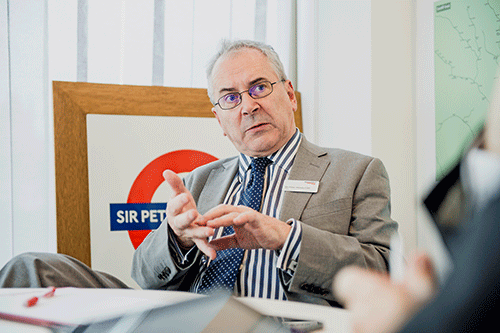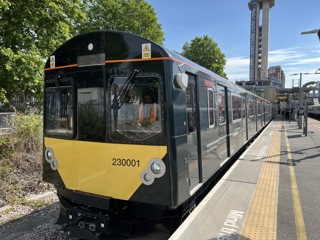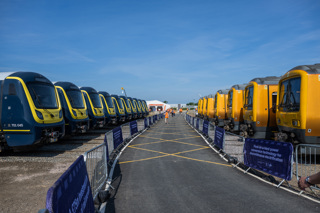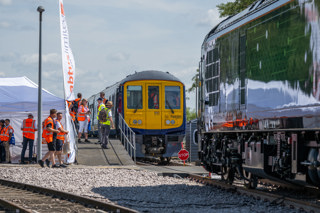- Read the full interview on the RailReview website: Hendy means business at Network Rail
Sir Peter Hendy CBE has had a long career in public transport, not least in buses. He has a reputation as being a shrewd, no-nonsense getter-of-things-done, whose sharp intellect is closely coupled with grass roots understanding and intelligence that makes things happen.
You only have to look at the spectacular progress made during his nine years as London’s Commissioner at Transport for London. For anyone else, getting something like the orbital London Overground metro financed and built in just three years would be a career pinnacle… but not for Hendy.
He would be the first to mutter something dismissive and Anglo-Saxon under his breath at this, but his knighthood for delivering a near-perfect transport system during the 2012 Olympics was an astonishing achievement. Yes, of course we know it was a team achievement, but all great teams can only function under great leadership. And Hendy’s leadership was inspired, inspiring and very effective. Hence the knighthood. He commands respect and is popular - and it is very difficult to be both popular and respected.
His appointment at NR came at a crucial time. To say that his new organisation was ‘on the ropes’ last summer would be an understatement. It had crashed into 2015 on a tsunami of bad news at King’s Cross and Paddington, where Christmas engineering work had been chaotically mismanaged by NR’s Infrastructure Projects (IP) division. Massive reputational damage had been inflicted on a company already on the back foot.
Further pain followed as Great Western and northern electrification projects went badly wrong, as costs soared and work fell horribly behind as a consequence of various technical issues. On the GW project, it was perceived that costs had virtually tripled from £800 million to well over £2 billion, amid reports of track possessions where either no one showed up to actually do anything or only a single mast was installed.
Finally losing patience, the Government stepped into direct control of what was now seen as effectively an arm of the DfT, and dramatically ‘paused’ the Midland Main Line electrification. NR’s humiliation reached new levels.
Confusion reigned. While Government spokesmen and ministers relentlessly used the ‘paused’ argument, no one actually believed it, and exasperated contractors were confidentially briefed in presentations by very senior NR managers where it was made clear that “the MML scheme isn’t paused - it’s dead”.
This was the supply chain chaos and reputational meltdown into which the pugnacious but capable Hendy was parachuted by government.
Hendy on… Devolution
“If it’s the right thing to do then we should do it. So when Mark proposed to the board that we would accelerate devolution, we all agreed that it was the right thing to do. It fits perfectly well with a recent letter from the Chancellor that he actually wanted us to accelerate devolution. So that was actually a request from the Chancellor.
“It also fits with the three tenets that Nicola has at the core of her report, which is devolution. I think it’s the right thing to do.
“I also think it’s a good thing that it’s being done under the umbrella of a much stronger drive to produce better operational performance. My observation is that Network Rail, over successive managements, has had some wildly different policies. But by and large, I’m now seeing a really strong and continuing attempt to run the railway better, which is what Phil Hufton is working hard to do.
“The context of devolution is that you don’t stop that performance drive, you help it by giving people greater empowerment.”
Hendy on…Nationalisation
“There have been two structures since BR that brought private money into the railway. The first was Railtrack, owned by individual shareholders, and it dramatically failed. Then NR came along, as a clever creation to get private money - or rather, Government-backed money - in a context of a private company. And that’s now been reclassified on the public balance sheet. So neither of those are now available.
“So how else do you do it? History is the most powerful argument you could make for suggesting that nationalisation and being a publicly-owned company is not the whole answer - because there’s been no time in history where anybody in a company owned by the Government has ever had any investment money. Never.
“Go right back to the formation of British Rail. It was created in order to compensate for the wearing out of the Big Four in the Second World War. But there was virtually no investment. Sure, BR got a big pile of money
in the 1955 modernisation plan, but it petered out in 1961/62.
“Since then BR was hand to mouth on investment, and the great thing about the privatisation era - particularly the last 12 years of NR - is there has been quite a lot of money. And look what it’s done, at the bloody fantastic stations that have been built. Birmingham New Street… would that have ever been built under BR? Very, very doubtful.”
Hendy on…Cost control
“The real issue is that until September 2014, as long as it was an economic cost or price, it didn’t really matter how much it cost because you had access to unlimited funding. Don’t miss that. If you’re exchanging a long-term ability to get as much money as you need providing someone independently judges it as worthwhile expenditure with a fixed treasury limit, it’s a huge difference.
“I’m not used to that. What I’m used to is saying: ‘that’s all the money that you’ve got, how’s best to spend it’?
“My observation is that the entire railway industry - and not excluding the Government - had all come to live in circumstances where, provided you could justify its economic basis, you could access as much capital as you like.
“But the alcohol store in the brewery has been locked up now, so we’d better sober up. But it’s not like there isn’t any money, because a fixed borrowing limit of £30.9bn is not an inconsiderable amount!
“And on an historic basis, it’s probably more than any Government has previously put into the railways over a similar period. But no, it isn’t unlimited. And so yes, I think that everybody has to learn some lessons.
“There are lessons about project initiation - be very clear about what you want and be equally clear why you want it. Then be clear about scope - don’t inflate that scope, and most of all, don’t let engineers run away with inflating a job by putting all manner of bells and whistles on it. Then deliver it properly. And these are all especially important when you do have a great deal of money to spend.”
Hendy on…Long-term planning
“I think it would be quite reasonable to work towards a longer-term plan for the railways, so you can see how it pans out and you can see where the money should go.
“My experience of doing it in London is that you select the projects that are ready - when you know that they’re ready, when you know how much they’re going to cost, and you know how you’re going to do them.
“You then slot them in, remembering that you can’t do any more than you have in the financial period for which you’re being funded. But you’re much more likely to get it right if you know what you are doing.
“Although Crossrail took - depending on your view - either 40 or 60 or 80 years to get to fruition, the one good thing about Crossrail was the day it was authorised we knew exactly what it was. We knew exactly how long it would take and we knew exactly when it was going to be delivered. And the outcome of
that is that Crossrail will be delivered on time and on budget.
“My experience is that if you try hard, then you get something done. But longer-term thinking must be inevitable.”
Hendy on…Rail growth
“Of all the issues for the railway, growth is one of the biggest. How do you cope with it? What is it that you can do?
“And regardless of how you do it, the reason for doing it is because the people who can’t travel if you get it wrong are not, by and large, people going to the seaside at Skegness for the day or going to Brighton to walk along the front. They are the millions of people at Clapham Junction, Wimbledon and East Croydon who can’t get to work.
“That’s why you have to keep the railway growing. This is also true in the urban centres outside London, and that’s what the imperative is. That’s exactly the same problem we faced at TfL, which is if you don’t do this and you’re not clever technically and you don’t have enough money, you just force people off the railway.
“But realistically there’s no other method of travel in those areas - conceptually you could drive, but practically you just can’t. That has a damaging effect on the economy.
“That’s the point. That’s why you’ve got to keep going. That’s why this is a seriously big issue.”
- This feature was published in RAIL 794 on February 17 2016
- Enjoyed the extract? Read the full interview on the RailReview website: Hendy means business at Network Rail


















Login to comment
Comments
No comments have been made yet.